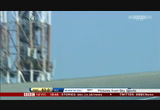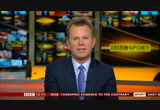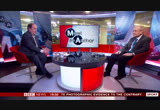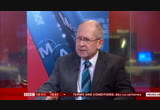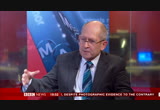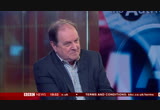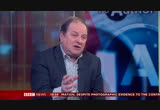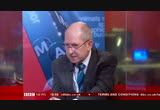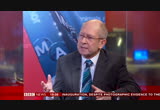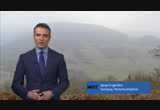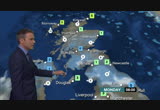tv Meet the Author BBC News January 22, 2017 7:45pm-8:01pm GMT
7:45 pm
series already lost, jason roy belted some respectability early with his third straight 50. captain eoin morgan continued the positivity. but england's batsmen continued to get set and get out. balls that chimed hit me, hit straight to the fielders. as the innings looked to be heading south, ben stokes sent the indian bowling flying with a quickfire half—century as england made 321. virat kohli is normally india's weapon for such cases, dropping him is rarely recommended. he followed the england pattern by passing 50 and stuck to the script by not kicking on. 16 needed from the final over. first ball six, next ball boundary. six from four now needed. it was as close as india got. after a winter of toil, the five run victory was finally a result to ring home about. ben crouch, bbc news. wasps are into the european
7:46 pm
champions cup quarter—finals after a convincing 41—27 win over zebre in italy wasps ran in seven tries, including one for man of the match elliot daley, who was making his 150th appearance for the club. connaught are out after a 19 points to 10 defeat to toulouse. arthur bonneval scored the pick of the three tries for the french side. a losing bonus point would have been enough to see connaught through but they were just short. the draw for the quarter finals has been made. wasps will play leinster and saracens will host glasgow. in the european challenge cup, harlequins were knocked out after losing 27—17 to stade francais. the match was delayed because of a frozen pitch. easy understand bernie ecclestone could step down from his position as formula i executives as early as this week. it would end his 41 year
7:47 pm
reign in the sport. american company liberty media wants a revamp which could see ecclestone east side. ronnie o'sullivan is playing joe perry in the final of the masters snooker at alexandra palace. it was 4—1; at the start of this session. ronnie o'sullivan has won the first frame after the interval. looking good to go 6—4 ahead. looking good to go 6—4 ahead. looking to win the event for the seventh time. first to ten wins who will take the title. england's tommy fleetwood has won the abu dhabi championship, his second european tour title. fleetwood shot a final round score of 67, finishing on 17 under par — a shot ahead of us open champion dustin johnson. and spain's pablo larrazabal. it's been a red letter day for british skiing. dave ryding has become the first
7:48 pm
british skier to claim a world cup alpine medal since 1981. he finished second in the men's slalom at kitzbuhel. he was quickest after the first run but was eventually beaten into second place by home favourite marcel hirscher. no brit has won an alpine world cup ski race in the fifty years of the competition. the last british skier to get onto the podium was konrad bartelski in 1981. now its time for meet the author. you have to be brave to write a sequel to a novel by hg wells, the father of science fiction. but stephen baxter has done it for the second time. having taken on the story of the time machine more than 20 years ago, he has now written the massacre of mankind, which is the story of the return of the martians after their defeat in wells's classic story
7:49 pm
the war of the worlds. stephen baxter, maths and physics teacher—turned—author, is one of our best—known science fiction authors, with more than a0 books to his name and he has also collaborated with arthur c clarke, no less, and terry pratchett. now he takes on one of his biggest challenges. welcome. so the martians are back. why? well, they always intended to, i think. the first expedition, as we know, failed. there is so much they didn't anticipate — the bacteria on the earth particularly. they didn't anticipate resistance, i don't believe. they did manage to down a few artillery shells and so forth. didn't really expect the conditions of the earth. wells says they were baffled by seeing ships in the sea —
7:50 pm
no deep oceans on mars. i think the first expedition was like columbus. he gets over the atlantic and has no idea where he is or what he's dealing with. what followed that is the conquistadors — more purposeful and they know what they want and how to get it as well. so it's a story not just of fear on earth, the sense of impending doom, it's the story of mutual incomprehension. yes, i think so. rather like the story of the americas, i guess. but the martians are on a kind of different moral level, in a sense. and wells emphasised this. they are loyal to each other. they treat us as livestock, basically. awkward livestock that is liable to attack you if you're not careful, but livestock. as with animals, they are loyal to each other, they come back to each other and save each other when they are wounded and so forth, and what they're trying to do
7:51 pm
is save the race from a catastrophe back on mars. you talk in terms of wells in terms of enormous respect, obviously, but a kind of affection for his vision. what does he mean to you? well, he was the father of science fiction, i think it's fair to say that. if he had done nothing else, that would have been massively important for me. but he did all sorts of other things. he did. he was a big figure in the world and i think after his death we've rather forgotten that. he was a massive public figure all the way through to the second world war. very popular in the first world war, accounts of the true condition of life in the trenches and so on. and i think his life's work in a way was crystallised by his work on the declaration of the rights
7:52 pm
of man, his work on that influenced what came after. he was a famous idealist but in his great science fiction books, the time machine, war of the worlds, which was published just before the turn of the century in the 1890s, he was doing something that really hadn't been done before. trying to imagine the world in a way nobody had ever seen or read before. no, that's true. there had been visions ofjourneys to other planets but nothing as rigorous and scientifically thought—out as wells. his vision of mars in particular. he used the logic of the time, which was the sun was cooling down and the further from the sun a planet was, the older it was. so mars is old and cooling. it is locked in an ice age and the martians have had to reduce themselves to a kind of minimal, bunker—like existence to cling on, and now they have got to that. that's one of the fascinating things that emerges in your own story the massacre of mankind — the sympathy for, as it were, the enemy, the other side. i think we, the readers, who aren't under the feet of the martians, can see glimmers of sympathy for them. as i say, they are loyal to each other. the way you talk about the story and the martians is interesting
7:53 pm
because you've written dozens of science fiction stories of your own but it's almost as if you're coming back to the motherload of science fiction with this story. the fascination that we have with mars is the archetypal fascination with the other. yes, mars was always... in the telescopic age, mars was the only world whose surface you can see apart from the moon, which was obviously dead, so you could project your fantasies on it. which we did. all the way through to the 1960s, actually, when the first space probes went past and it was much more like the moon, as it turns out. now we believe life of some kind might be up there. yes, it is the motherload of dreams. you talk about projecting ourfantasies. is that really what science fiction is about? well, i think you could say that science fiction is about... it's not about the future, or in other words it's
7:54 pm
about the here and now, predicting our concerns, in a way. so with wells and war of the worlds he was reflecting late victorian angst about imperialism and colonialism and the damage it can do to the colonial conscience, for one thing. now i think we could look at it as a metaphor for climate change. you know, the martians‘ planet has collapsed in a terrible way and migrants, heavily armed migrants, come to the earth. what is it that gives this story such a grip? is it the sense of impending doom? is it as simple as that? the fear that lurks inside all of us in some way? i think it works on many levels and as a myth you can take out of it what is relevant to your time. the sense of the universe as evolving around us, not necessarily to our liking, and we have to adapt. in other words, in every age there is some threat that seems impossibly big. and terrific. yes.
7:55 pm
as i mentioned earlier, you have collaborated with some extraordinary authors and arthur c clarke comes to mind. a name who's known to people who are not necessarily science fiction addicts as somebody who could imagine the unimaginable. what was he like when you communicated with him and talked to him late in his life? yeah, he was in his 80s when i was working. he had lived through so much. much of what he predicted logically had worked out. a lot of it hadn't. but he was continually interested... did that bother him? he got it wrong? what i asked him about specifically was about space flight — how come we don't have places on mars now, as predicted. he said no, because so much of what has happened was so enriching. the robot probes to jupiter and beyond. he loved all that. he set novels out there late in life. so he never got tired of that curious search for the next thing that was coming round the corner? exactly, yeah. he was always open to curiosity, to new influences. to new writers. he read the latest sf, like mine, and stayed
7:56 pm
curious right till the end. let's go back finally to the martians themselves. when we've finished this book, what do you want us to think about the martians? i think the lesson we have to learn from the martians is what the characters are working for at the end of the book and, indeed, at the end of war of the worlds. in a way, the specific nature of the martians and their actions doesn't matter. it is the way they represent the wider context of our future. you know, our earth isn't infinite. it is one grain of sand in infinity. that is the specific story and you have to take it away. rather than columbus and what he did, his journey emphasised the globalisation of mankind. so i think it's the universalisation of mankind that you need to take away. would you like to meet a martian? i would probably be running fast the other way! i would be fascinated.
7:57 pm
if i could watch from a height maybe, yes. watch from a distance. stephen baxter, thank you very much. thank you. a winter's tale after some emerged from their coldest night for four yea rs. in the sunshine it was quite delightful, in other places today it was grey and overcast all day long. there was snow falling in wales. 0vernight tonight it stays cold. the blue tinged areas will be particularly cold with severe frost in places. 0ther spots where it stays cloudy will not be so cold. the odd shower but the most places dry. temperatures locally will get a lot lower than these numbers suggest. if i wipe away the clouds and concentrate on fog, later on tonight that will be the main talking point, the main story.
7:58 pm
it will be quite problematical heading into monday and tuesday, disruption entirely possible. warnings in force. specifically as we end the night across southern counties is where the worst fog will be with some airports affected, so allow extra time and get in touch with the operators. it's not foggy everywhere. sunshine across wales, part of the west country, fog across parts of the midlands into northern england, big questions about northern ireland and scotland, probably less fog but certainly a touch of frost around and slippery surfaces. where you wake up to fog it could stick around for much of the day. if that happens it will be especially cold. having said all that, many settle into a fine day with sunshine, and in the sunshine as we saw today temperatures will bounce back quite nicely, getting up to four or 5 degrees. but where the fog lingers you will struggle to get above freezing. the fog will reform and become quite
7:59 pm
extensive by tuesday morning across parts of england and wales in particular, in some places lingering for much of the day. change in the weather for northern ireland and scotland, breeze freshening with patchy outbreaks of rain pushing in from the west. turning milder here, nine or 10 degrees. further south and east it will be colder where the fog lingers. later this week the fog should clear as the wind picks up. but a chilly wind for a time before eventually as we head to the weekend it should turn milder. this is bbc news.
8:00 pm
the headlines at 8. labour has called on the prime minister to make a commons statement tomorrow about problems with a test of the trident missile system and what she knew when. i have absolute faith in our trident missiles, when i made that speech in the house of commons what we were talking about was whether or not we should renew our trident. the prime minister says she wants to establish a "productive working relationship" with president trump when they hold talks on friday. the white house accuses part of the media of dishonestly reporting numbers attending his inauguration. also in the next hour. a shock for the world number one at the australian open. andy murray's hopes of winning the tournament for the first time, end with a surprise fourth round defeat by the world number 50. and, it helped define the 1990s, now trainspotting returns for a new generation.
49 Views
IN COLLECTIONS
BBC News Television Archive
Television Archive  Television Archive News Search Service
Television Archive News Search Service 
Uploaded by TV Archive on

 Live Music Archive
Live Music Archive Librivox Free Audio
Librivox Free Audio Metropolitan Museum
Metropolitan Museum Cleveland Museum of Art
Cleveland Museum of Art Internet Arcade
Internet Arcade Console Living Room
Console Living Room Books to Borrow
Books to Borrow Open Library
Open Library TV News
TV News Understanding 9/11
Understanding 9/11